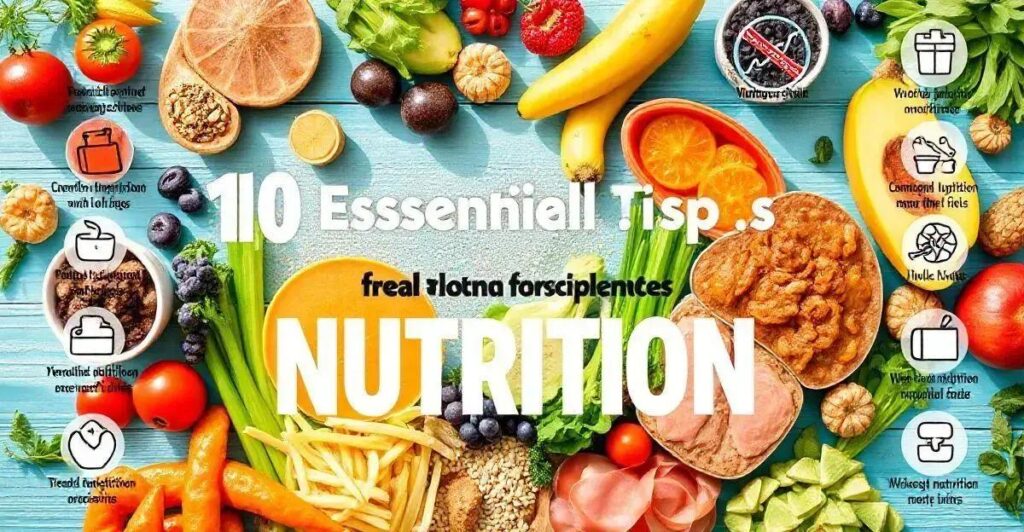In today’s fast-paced world, it’s easy to overlook the importance of nutrition in our daily lives.
But the truth is, what we eat has a profound impact on our overall health and wellbeing.
By incorporating a balanced diet rich in essential nutrients, you can boost your energy levels, improve your mood, and even reduce your risk of chronic diseases.
In this article, we’ll explore the power of nutrition and provide you with expert tips and advice on how to make it a part of your daily routine.
Understanding the Importance of Nutrition
Nutrition plays a vital role in maintaining overall health and wellbeing. Adequate nutrition provides the body with the necessary building blocks to function properly, from repairing and growing tissues to regulating bodily processes. Without proper nutrition, the body may suffer from a range of negative effects, from fatigue and digestive issues to mood swings and decreased immunity. In this article, we’ll explore the importance of nutrition and provide you with expert advice on how to make it a priority in your daily life.
Benefits of a Balanced Diet:
A balanced diet provides the body with the necessary nutrients, vitamins, and minerals to maintain optimal health. A diet rich in fruits, vegetables, whole grains, and lean proteins can help to boost energy levels, support healthy weight management, and reduce the risk of chronic diseases such as heart disease, diabetes, and certain cancers. By incorporating a balanced diet into your daily routine, you can improve your overall health and wellbeing, increase your productivity, and enhance your mental clarity.
Nutrition for Energy and Vitality:
Are you feeling tired, sluggish, and lacking in energy? A diet rich in nutrients, vitamins, and minerals can help to boost your energy levels and support overall vitality. Foods high in iron, such as red meat, spinach, and beans, can help to increase oxygen flow to the brain and muscles, while foods rich in complex carbohydrates, such as whole grains and fruits, can provide a sustained energy boost. Additionally, omega-3 fatty acids found in fatty fish, flaxseeds, and walnuts can help to reduce inflammation and improve overall health.
Common Nutrition Myths Debunked:
There are many common nutrition myths that can lead to confusion and misinformation. For example, the myth that low-fat diets are the key to weight loss, when in fact, a balanced diet with moderate amounts of healthy fats is more effective. Another myth is that all carbohydrates are bad for you, when in fact, whole grains and fruits are essential for good health. In this article, we’ll debunk common nutrition myths and provide you with expert advice on how to make informed decisions about your diet.
Tips for Healthy Eating:
Healthy eating doesn’t have to be complicated or time-consuming. Here are some simple tips to help you make healthy choices: plan your meals in advance, shop for whole foods, cook at home, and avoid processed and packaged foods. Additionally, incorporate a variety of colors on your plate, including fruits, vegetables, whole grains, and lean proteins. By following these simple tips, you can improve your overall health and wellbeing, reduce your risk of chronic diseases, and enhance your mental clarity.
Conclusion: Making Nutrition a Part of Your Life:
In conclusion, nutrition plays a vital role in maintaining overall health and wellbeing. By incorporating a balanced diet rich in essential nutrients, vitamins, and minerals, you can boost your energy levels, support healthy weight management, and reduce the risk of chronic diseases. Remember, small changes can add up, so start by making one or two healthy changes to your diet each week. With time and patience, you can develop a healthy relationship with food and improve your overall health and wellbeing.
Benefits of a Balanced Diet

A balanced diet provides numerous benefits for overall health and wellbeing. By consuming a variety of whole foods, including fruits, vegetables, whole grains, lean proteins, and healthy fats, you can improve your energy levels, support healthy weight management, and reduce your risk of chronic diseases.
A balanced diet can also boost your immune system, improve your mental clarity, and enhance your overall quality of life. In addition, a balanced diet can help to reduce inflammation, improve digestion, and support healthy bones and joints.
By incorporating a balanced diet into your daily routine, you can experience these numerous benefits and improve your overall health and wellbeing.
Nutrition for Energy and Vitality
Nutrition plays a crucial role in maintaining energy levels and overall vitality. Adequate nutrition provides the body with the necessary building blocks to function properly, from repairing and growing tissues to regulating bodily processes. A diet rich in essential nutrients, vitamins, and minerals can help to boost energy production, improve mental clarity, and support overall health and wellbeing.
Foods high in iron, such as red meat, spinach, and beans, can help to increase oxygen flow to the brain and muscles, while foods rich in complex carbohydrates, such as whole grains and fruits, can provide a sustained energy boost.
Additionally, omega-3 fatty acids found in fatty fish, flaxseeds, and walnuts can help to reduce inflammation and improve overall health.
Common Nutrition Myths Debunked

Despite the abundance of nutrition information available, many people still hold onto common myths and misconceptions about what constitutes a healthy diet. One of the most pervasive myths is that low-fat diets are the key to weight loss, when in fact, a balanced diet with moderate amounts of healthy fats is more effective.
Another myth is that all carbohydrates are bad for you, when in fact, whole grains and fruits are essential for good health.
Additionally, many people believe that all proteins are created equal, when in fact, lean proteins like chicken, fish, and beans are better for overall health than processed meats like hot dogs and sausages.
In this article, we’ll debunk these common nutrition myths and provide you with expert advice on how to make informed decisions about your diet.
Tips for Healthy Eating
Eating healthy doesn’t have to be complicated. Here are some simple tips to help you make healthy choices: plan your meals in advance, shop for whole foods, cook at home, and avoid processed and packaged foods.
Choose a variety of colorful fruits and vegetables to ensure you’re getting a range of essential vitamins and minerals.
Avoid added sugars and saturated fats
by opting for natural sources of sweetness and healthy fats. Additionally, drink plenty of water throughout the day to stay hydrated and help with digestion.
By following these simple tips, you can improve your overall health and wellbeing, reduce your risk of chronic diseases, and feel more energized and focused throughout the day.
Conclusion: Making Nutrition a Part of Your Life

By incorporating a balanced diet into your daily routine, you can experience numerous benefits for your overall health and wellbeing. From boosting energy levels and supporting healthy weight management to reducing the risk of chronic diseases and improving mental clarity, a balanced diet can have a profound impact on your life.
Remember, small changes can add up, so start by making one or two healthy changes to your diet each week. With time and patience, you can develop a healthy relationship with food and improve your overall health and wellbeing.
Frequently Asked Questions about Nutrition
What is the importance of nutrition in our daily lives?
Nutrition plays a crucial role in maintaining overall health and wellbeing. A balanced diet provides the body with the necessary building blocks to function properly, from repairing and growing tissues to regulating bodily processes.
What are some common nutrition myths that I should be aware of?
Despite the abundance of nutrition information available, many people still hold onto common myths and misconceptions about what constitutes a healthy diet. One of the most pervasive myths is that low-fat diets are the key to weight loss, when in fact, a balanced diet with moderate amounts of healthy fats is more effective.
What are some tips for healthy eating?
Eating healthy doesn’t have to be complicated. Here are some simple tips to help you make healthy choices: plan your meals in advance, shop for whole foods, cook at home, and avoid processed and packaged foods.
How can I make nutrition a part of my daily life?
By incorporating a balanced diet into your daily routine, you can experience numerous benefits for your overall health and wellbeing. From boosting energy levels and supporting healthy weight management to reducing the risk of chronic diseases and improving mental clarity, a balanced diet can have a profound impact on your life.
What are some common nutrition mistakes that I should avoid?
Some common nutrition mistakes include skipping meals, relying on processed and packaged foods, and not staying hydrated. Additionally, not getting enough physical activity can also have negative effects on overall health.
How can I stay motivated to maintain a healthy diet?
Staying motivated to maintain a healthy diet can be challenging, but there are several strategies that can help. These include setting realistic goals, finding healthy recipes that you enjoy, and tracking your progress.
